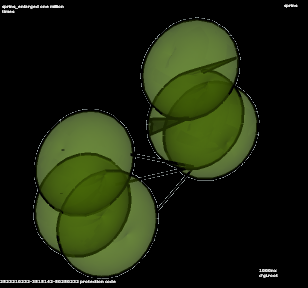Sprins
From Sprinsology
(→Elements and nervulae) |
|||
| Line 31: | Line 31: | ||
== Unitae assembly and naming == | == Unitae assembly and naming == | ||
| + | === Unitae types === | ||
Unitae are a group of elements (similar to molecules in chemistry). They are inseparable, unlike chemical compounds. An example is P3H. There are many types of unitae: | Unitae are a group of elements (similar to molecules in chemistry). They are inseparable, unlike chemical compounds. An example is P3H. There are many types of unitae: | ||
| Line 43: | Line 44: | ||
* Malayalae | * Malayalae | ||
| - | Unitae can be also elementary, such as P, | + | Unitae can be also elementary, such as P, P<sub>2</sub>, P<sub>3</sub>, H<sub>4</sub> etc. |
| + | |||
| + | === Superstem and substem of elements === | ||
| + | |||
| + | The '''superstem''' and '''substem''' are unique "words" that are very important in unitae naming. Every element has an unique superstem and a substem. They are: | ||
| + | |||
| + | {| class="wikitable" | ||
| + | |||
| + | |- | ||
| + | |||
| + | ! Element name | ||
| + | |||
| + | ! Superstem | ||
| + | |||
| + | ! Substem | ||
| + | |||
| + | |- | ||
| + | |||
| + | | Parsintha, pars- | ||
| + | |||
| + | | Parsintha, -an | ||
| + | |||
| + | |- | ||
| + | |||
| + | | Hyania, hyn- | ||
| + | |||
| + | | Hyania, -in | ||
| + | |||
| + | |- | ||
| + | |||
| + | | Oropia, orop- | ||
| + | |||
| + | | Oropia, -on | ||
| + | |||
| + | |- | ||
| + | |||
| + | | Corothola, kor- | ||
| + | |||
| + | | Corothola, -ol | ||
| + | |||
| + | |- | ||
| + | |||
| + | | Sallicina, sal- | ||
| + | |||
| + | | Sallicina, -il | ||
| + | |||
| + | |- | ||
| + | |||
| + | | Vidiridia, vid- | ||
| + | |||
| + | | Vidiridia, -at | ||
| + | |||
| + | |- | ||
| + | |||
| + | | Elocca, el- | ||
| + | |||
| + | | Elloca, -et | ||
| + | |||
| + | |- | ||
| + | |||
| + | | Ipicca, ip- | ||
| + | |||
| + | | Ipicca, -it | ||
| + | |||
| + | |- | ||
| + | |||
| + | | Tattana, tatt- | ||
| + | |||
| + | | Tattana, -ut | ||
| + | |||
| + | |- | ||
| + | |||
| + | | Quegnaroc, quegnar- | ||
| + | |||
| + | | Quegraroc, -oc | ||
| + | |||
| + | |} | ||
Revision as of 14:47, 24 February 2008
Sprins is a unique mixture of molecules determining the spray's properties. It assembles systematically. Sprins' parts are units – elements (small mixtures of molecules) and binders – nervulae.
Contents |
Elements and nervulae
There are three types of elements:
- main (majors)
- rare (minors)
- very rare (malaya, singular malay)
Main elements are:
- Parsintha (marked with P)
- Hyania (marked with H)
- Oropia (marked with O)
- Corothola (marked with C)
- Sallicina (marked with S)
Rare elements are:
- Vidiridia (marked with V)
- Elocca (marked with E)
- Ipicca (marked with I)
- Tattana (marked with T)
There is only one discovered and documented malay: Quegnaroc (marked with Q).
There is three types of nervulae:
- single
- double
- triple
Unitae assembly and naming
Unitae types
Unitae are a group of elements (similar to molecules in chemistry). They are inseparable, unlike chemical compounds. An example is P3H. There are many types of unitae:
- Unitae
- Unithyns
- Unithyls
- Unithyms
- Unitiae
- Unithals
- Visuals
- Olfaudi
- Malayalae
Unitae can be also elementary, such as P, P2, P3, H4 etc.
Superstem and substem of elements
The superstem and substem are unique "words" that are very important in unitae naming. Every element has an unique superstem and a substem. They are:
| Element name | Superstem | Substem |
|---|---|---|
| Parsintha, pars- | Parsintha, -an | |
| Hyania, hyn- | Hyania, -in | |
| Oropia, orop- | Oropia, -on | |
| Corothola, kor- | Corothola, -ol | |
| Sallicina, sal- | Sallicina, -il | |
| Vidiridia, vid- | Vidiridia, -at | |
| Elocca, el- | Elloca, -et | |
| Ipicca, ip- | Ipicca, -it | |
| Tattana, tatt- | Tattana, -ut | |
| Quegnaroc, quegnar- | Quegraroc, -oc |

